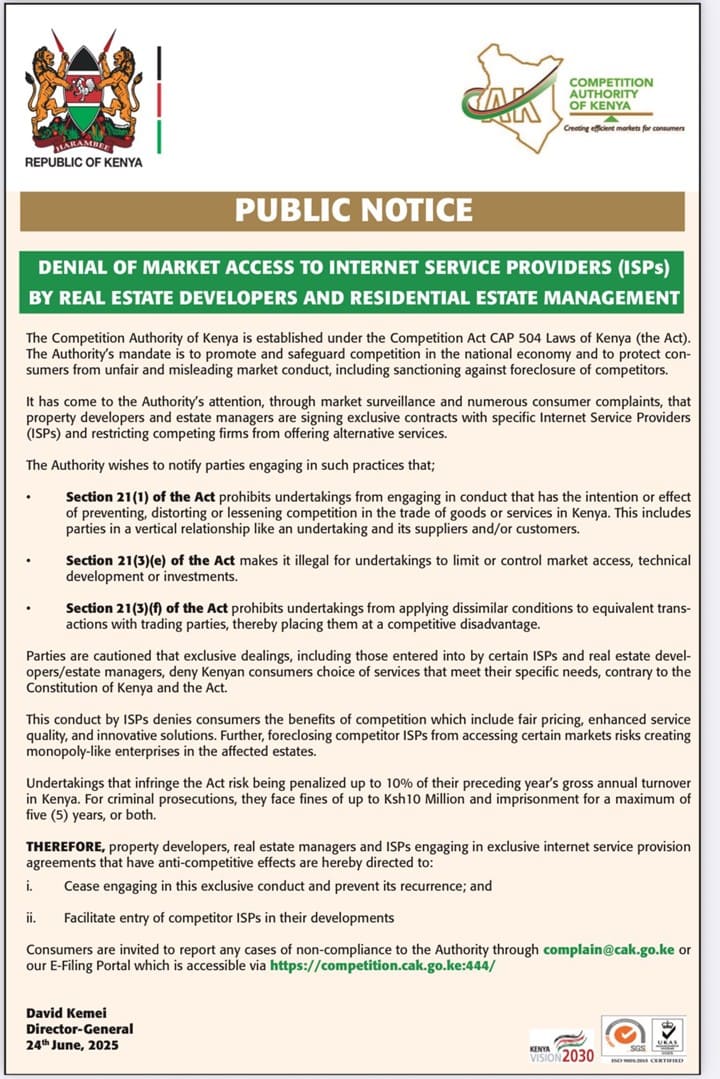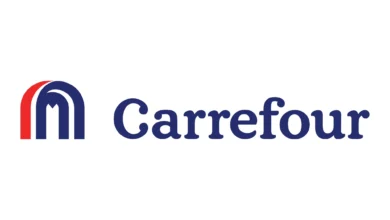
Insights At a Glance:
- CAK has outlawed exclusive internet service agreements between ISPs and residential estate managers or developers.
- The practice limits competition and violates key sections of Kenya’s Competition Act.
- Offenders risk hefty fines (up to 10% of annual turnover) and possible jail terms.
- Kenyans are urged to report non-compliant developments to CAK for action.
There’s a certain kind of internet injustice that many Kenyans face silently — living in a modern estate but stuck with just one internet provider. It’s like walking into a supermarket and finding only one brand of bread, every single time. No options, no alternatives, just take it or leave it.
Now, the Competition Authority of Kenya (CAK) is putting its foot down.
In a public notice issued on June 24, 2025, CAK has warned real estate developers, estate managers, and ISPs that these exclusive arrangements — where only one ISP is allowed into a building or estate — are not just unfair, they’re illegal. And believe me, this is not just policy-speak. It’s personal.
During my time living in Eldoret, I stayed in an apartment that was polished and pleasant — but digitally fenced in. The catch? Only Safaricom Fiber was available. No Zuku. No Faiba. No other options. As a tenant, I wasn’t choosing a service; I was accepting a monopoly. That’s how it works in many gated communities: your Wi-Fi is decided before you even unpack your router.
Just to be clear, I’m not implying that Safaricom had any exclusive deal with the landlord or estate manager of the apartment I lived in. That wasn’t the case — it’s just that Eldoret doesn’t have heavy fiber optic coverage, and Safaricom happens to be the dominant name in areas where fiber is available. So naturally, they were the only player in that space. The issue wasn’t exclusivity — it was availability.
Fast forward to Kisumu. My new apartment gave me freedom. Both Safaricom Fiber and Zuku were available, and the competition was real. Zuku’s sales team was relentless — flyers under the door, soft knocks every weekend, asking me to switch providers. I asked one of them, “Do you know Safaricom is already here?” He grinned. “Yes, but we want you to know you have a choice.”
And that — choice — is exactly what CAK is fighting for.
CAK’s Message: End Exclusive Deals or Face Penalties
The Authority says it has received multiple consumer complaints and, through its surveillance, discovered that some property developers and estate managers are entering exclusive contracts with specific ISPs. These arrangements shut out competing providers, effectively holding consumers hostage to one service.
According to the notice, this practice violates several provisions under the Competition Act CAP 504, including:
- Section 21(1): Prohibits actions that reduce or prevent competition.
- Section 21(3)(e): Bars undertakings from limiting market access.
- Section 21(3)(f): Prohibits applying unequal conditions to similar transactions.
These exclusive deals don’t just hurt competition — they rob consumers of fair pricing, better service quality, and tech innovation.
The Price of Defiance: Heavy Fines and Jail Time
CAK isn’t bluffing. Companies that violate the Act risk being fined up to 10% of their previous year’s gross annual turnover. And for those who think they’re untouchable, criminal prosecution is on the table: KES 10 million in fines or up to 5 years in jail.
The directive is crystal clear:
- Stop exclusive ISP arrangements immediately.
- Open up residential estates to competing ISPs.
And if you’re living in a building where only one ISP is allowed in? Report it. You can reach CAK at complain@cak.go.ke or file through their portal at https://competition.cak.go.ke:444/.
This is more than a regulatory announcement. It’s about protecting your right as a consumer to decide what internet service works for you. Whether you’re a gamer, a streamer, a remote worker, or just someone who wants to compare packages before committing, you deserve options.






